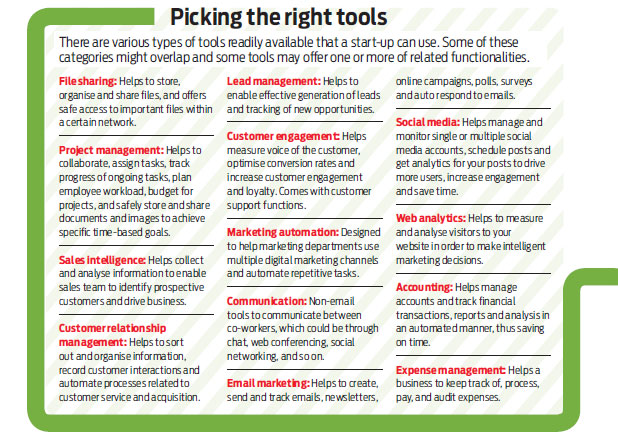Pune-based start-up Digital Gorkha is a housing security system that makes the process of safeguarding a property more organised, efficient and effective. Incepted in February 2015, it had raised Rs.1 crore in the ideation stage itself before launching in March. Like many other smart start-ups, Digital Gorkha utilises various online tools in its day-to-day processes.
Some of the tools it uses are MailChimp, an email marketing tool, to send promotional emails, newsletter and system generated emails to its clients; file sharing tool Dropbox to backup and share important documents; expense management tool Expensify to track expenses; and project management software Asana to manage projects and work remotely with the team.
 “These tools save time and increase productivity. Most of them store data on cloud, which provides accessibility to resources at any given time. These tools also come at moderate price points that save money,” says Hitesh Malviya, founder, Digital Gorkha.
“These tools save time and increase productivity. Most of them store data on cloud, which provides accessibility to resources at any given time. These tools also come at moderate price points that save money,” says Hitesh Malviya, founder, Digital Gorkha.
Like them, a 21st century start-up has its task cut out on several fronts. Increased competition and fast changing technologies have made it even more challenging for start-ups to survive and grow. Moreover, they are bound by limited resources, making it even more difficult for them to compete with larger firms. However, at the same time, there are several online tools that start-ups have at their disposal to improve productivity, get organised and save time and money.
“Work easy, work well,” says Shobhit Arora, founder and CEO, worldartcommunity.com, an online marketplace for arts, crafts and design. “For start-ups in early stages, to drive efficiencies across business processes is critical. These efficiencies eventually help to better optimise costs and processes,” he says. Further, it is important for start-ups to actively test various scenarios and pivot, if needed. At every stage, there’s a need for quality analytics for better decision making, which these tools enable. Besides, most start-ups operate with limited staff. Collaboration tools and process automation ensure that the start-up grows with the right foundation in place. Some of these processes have a strong customer impact as well.
For example, many start-ups have people working for them at different locations. A project management tool can help in planning, budgeting and time management to ensure that projects are completed on time. Likewise, a start-up can use customer relationship management (CRM) tools to help in customer retention and acquisition, sales intelligence tools to identify prospective customers and drive business and accounting tools. “Tools like Redmine help the development and operations team to assign the task efficiently and effectively to the team. It also acts as an ideation platform and helps nurture innovation and collaboration amongst all employees,” says Jobin Jose, chief operating officer, Talview, a start-up that provides platform for online video interviewing.
Save time and money
Most of these tools also help free up man-hours that would otherwise be spent on doing repetitive tasks. In the initial stages, such time can be put to use by the founders for more productive purposes. “Tools like Paybooks for pay roll and leave management, and Happay for expense management have helped us to reduce the man-hours spent and remove inefficiencies,” says Jose. Hiring manpower is one of the biggest expenses for a start-up and many of these tools also reduce or eliminate the need for hiring at much lower costs.
Choose wisely
While there are hundreds of such tools available, a start-up has to make the right choice of which tools to use. How do you go about it? Lars
Lin Villebaek, chief technology officer, Growth Enabler, a firm which provides growth advice and insights to businesses, has some words of advice, “Identify the first and most fundamental workflows for team logistics. Shortlist and test your top two or three tools for each purpose based on your defined selection criteria. Then it is time to make the workflows meet the tools, without compromising on the preferred workflow.” Once you have identified the tools, it is necessary to educate your team about the process, take feedback from everyone and build one process at a time until you see the tasks flowing effortless through your tools and processes.

“We decide to try a tool based on recommendation or after going through the reviews online. Once we invest time in trying the tool, we  evaluate the return on investment and also understand how much it fits with current processes. Also, the tool cost should fit in the start-up budget,” says Jose.
evaluate the return on investment and also understand how much it fits with current processes. Also, the tool cost should fit in the start-up budget,” says Jose.
It helps to try multiple tools before selecting the ones that best suit your start-up. “My advice is to install trial versions of all credible tools and then decide one for premium version, which can be adopted easily for your organisation,” says Malviya. The choice of tool also depends on the stage the start-up is at. Initially, basic tools might serve your purpose but, going ahead you might need to use tools that come with increased functionalities. “Each tool has its strengths and weaknesses. A classic example is Google Analytics, which is a simple-to-use tool and fairly comprehensive. If one wants to take the analytics to the next level, solutions like Kiss metrics come in handy,” says Arora. There are also websites which give comparisons between various tools.
If you are signing up for the premium version of a tool, apart from its features, also check-out the customer support channels they have. “One of the key things to look for when choosing a service provider is to examine their customer support channels—are they addressing their customers on social media? Success stories, testimonials and a clear and easy demonstration of their products and features, coupled with good designs and content are key,” says Prashant Chaudhary, co-founder, Mr. Right, a home improvement aggregator for handyman services.
Free or paid?
Many tools like Google Analytics are free to use. Some of them are free till a certain level of usage, beyond which they charge a fee. For example, Drop box has a free plan (2 GB storage), a basic pro plan (1TB storage at $10 per month) and a business plan (unlimited storage at $15 per month). Likewise, Mail Chimp allows you to send 12,000 emails a month to up to 2,000 subscribers for free, and has a monthly plan depending on the number of subscribers exceeding 2,000, and a high volume plan for businesses that need to send millions of emails. Most of these tools are cloud-based and hence allow a ‘pay as you go’ model where startups can pay only for the amount of usage in a certain month and buy credits for the same, which do not expire when left unused.
Even when paid, most tools offer a free trial period of one month. “We take a decision after we use the trial version or the free version as this gives us a better understanding before spending money on such tools. Once we have understood these tools on a small scale, we can go for the premium offering. I suggest use it for free before you spend big bucks,” says Malviya.
Using such tools can get rid of a lot of maintenance work in the day-to-day running of your start-up and allow you to focus more on your business. And, that could make all the difference!









